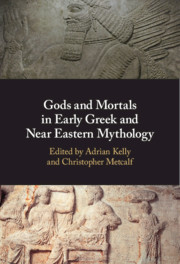Book contents
- Gods and Mortals in Early Greek and Near Eastern Mythology
- Gods and Mortals in Early Greek and Near Eastern Mythology
- Copyright page
- Contents
- Tables
- Contributors
- Acknowledgements
- Abbreviations
- Introduction
- Part I Contexts
- Part II Influence
- Chapter 5 Playing with Traditions
- Chapter 6 Etana in Greece
- Chapter 7 Of Gods and Men
- Chapter 8 Tales of Kings and Cup-Bearers in History and Myth
- Chapter 9 Heroes and Nephilim
- Chapter 10 Berossus and Babylonian Cosmogony
- Part III Difference
- Bibliography
- Index
Chapter 10 - Berossus and Babylonian Cosmogony
from Part II - Influence
Published online by Cambridge University Press: 27 March 2021
- Gods and Mortals in Early Greek and Near Eastern Mythology
- Gods and Mortals in Early Greek and Near Eastern Mythology
- Copyright page
- Contents
- Tables
- Contributors
- Acknowledgements
- Abbreviations
- Introduction
- Part I Contexts
- Part II Influence
- Chapter 5 Playing with Traditions
- Chapter 6 Etana in Greece
- Chapter 7 Of Gods and Men
- Chapter 8 Tales of Kings and Cup-Bearers in History and Myth
- Chapter 9 Heroes and Nephilim
- Chapter 10 Berossus and Babylonian Cosmogony
- Part III Difference
- Bibliography
- Index
Summary
This chapter offers insights into a long-term research project that seeks to distinguish between myths and their various manifestations in literary sources, and thus approaches Mesopotamian mythology as a body of sacred, oral stories that lie in the background both of texts and of other forms of cultural expression, in this instance the work of the Babylonian priest and historian Berossus, in particular Book I of his Babyloniaca, in which he summarised Babylonian cosmogonic beliefs for a Greek readership. While the links between this part of the Babyloniaca and the Akkadian poem Enūma eliš are well-known, Berossus combined knowledge of that text with a Mesopotamian myth of origins on the primeval pair ‘Father Sky and Mother Earth’ that was never fixed in writing. Taken together with sporadic evidence from Sumero-Akkadian sources collected by the author, the Babyloniaca emerge as an important source on this influential but elusive myth, which was overshadowed without being fully supplanted by the Marduk-centred theology of Enūma eliš.
- Type
- Chapter
- Information
- Gods and Mortals in Early Greek and Near Eastern Mythology , pp. 185 - 198Publisher: Cambridge University PressPrint publication year: 2021
- 1
- Cited by

